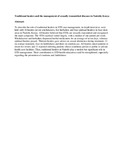| dc.contributor.author | Kusimba, J | |
| dc.contributor.author | Voeten, HA | |
| dc.contributor.author | O'Hara, HB | |
| dc.contributor.author | Otido, JM | |
| dc.contributor.author | Habbema, JD | |
| dc.contributor.author | Ndinya-Achola Jeckoniah O. | |
| dc.contributor.author | Bwayo, JJ | |
| dc.date.accessioned | 2013-04-25T08:01:53Z | |
| dc.date.available | 2013-04-25T08:01:53Z | |
| dc.date.issued | 2003 | |
| dc.identifier.citation | Int J STD AIDS.2003 Mar;14(3):197-201 | en |
| dc.identifier.uri | http://www.ncbi.nlm.nih.gov/pubmed/12665444 | |
| dc.identifier.uri | http://erepository.uonbi.ac.ke:8080/xmlui/handle/123456789/16700 | |
| dc.description.abstract | To describe the role of traditional healers in STD case management, in-depth interviews were held with 16 healers (seven witchdoctors, five herbalists and four spiritual healers) in four slum areas in Nairobi, Kenya. All healers believed that STDs are sexually transmitted and recognized the main symptoms. The STD-caseload varied largely, with a median of one patient per week. Witchdoctors and herbalists dispensed herbal medication for an average of seven days, whereas spiritual healers prayed. Thirteen healers gave advice on sexual abstinence during treatment, 11 on contact treatment, four on faithfulness and three on condom use. All healers asked patients to return for review and 13 reported referring patients whose conditions persist to public or private health care facilities. Thus, traditional healers in Nairobi play a modest but significant role in STD management. Their contribution to STD health education could be strengthened, especially regarding the promotion of condoms and faithfulness | en |
| dc.language.iso | en | en |
| dc.title | Traditional healers and the management of sexually transmitted diseases in Nairobi, Kenya | en |
| dc.type | Article | en |
| local.publisher | Department of Medical Microbiology, University of Nairobi, | en |

